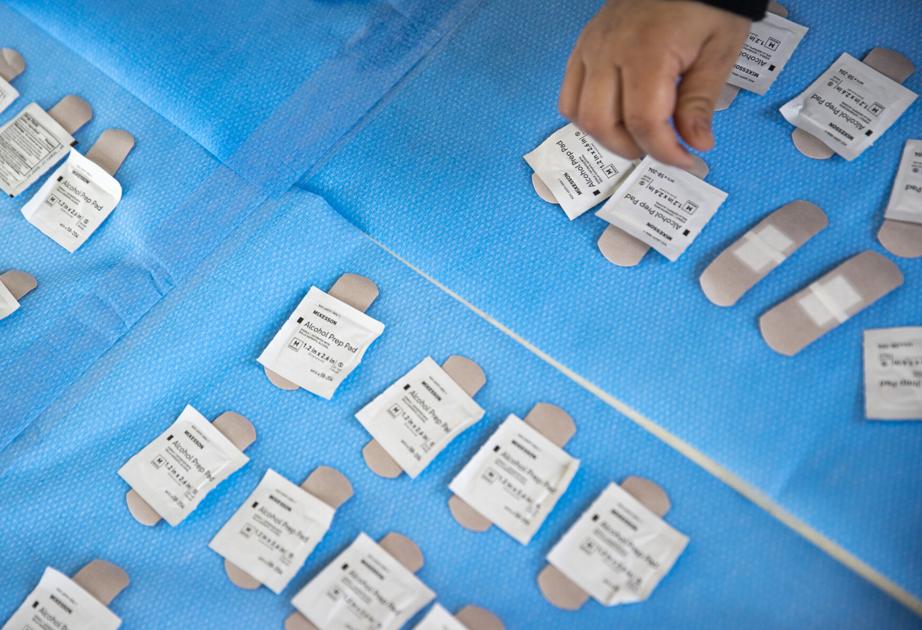One of South Carolina’s biggest dialysis providers said it could vaccinate all of its willing patients, who sit passively in their clinics for hours, several days a week, in a matter of days. The only problem: the state did not give him a dose.
As of March 23, 13 percent of Fresenius Medical Care’s 4,500 patients in South Carolina had been vaccinated, one of the company’s lowest rates on its national network. In most states, state or local governments have sent at least a few doses to Fresenius’ clinics, a spokesman said.
Fresenius said it is an easy sell to a population at risk, since dialysis patients are much more likely to become seriously ill or die from COVID-19 than the general population. In a study of patients with end-stage kidney disease who contracted the virus, more than half were hospitalized and 23 percent died of COVID-19, according to results published earlier this year in the newspaper Renal Medicine.
Officials in the SC Department of Health and Environmental Control said there was not enough vaccine for everyone and prioritized shipments elsewhere.

“They (dialysis centers) are among those we would love to send the vaccine to,” said Nick Davidson, senior public health deputy at DHEC. “The challenge now is that we cannot spread the vaccine across the state either … At the moment, we are just waiting for more vaccines to be able to apply them.”
Tricia Manigault, 55, is one of Fresenius’ most mobile patients. She usually goes on dialysis three times a week near where she lives in Mount Pleasant; she has been receiving treatments for three years to control her kidney failure. Manigault has checked the state’s vaccine appointment website every day and has been unable to find availability. So she has also been visiting local pharmacies to ask about canceled appointments and extra doses, also with no luck.
For Manigault, dialysis centers should have been grouped with nursing homes and assisted living facilities to receive the vaccine directly. Now, she is competing with the majority of the state’s population to find a place.
“I feel it would save my life,” said Manigault. “I believe that if I catch it (the virus), it would not be good. I see it as a lifesaver.”
She is one of about 11,000 South Carolina residents on dialysis, according to 2018 data from the United States Kidney Data System. South Carolina was scheduled to receive about 122,000 first doses of the vaccine in the week of March 22.

Dialysis centers’ concern about this fact was the subject of a letter that the American Society of Nephrology sent to President Joe Biden’s government in late February, urging leaders to open allocations and pointing out that the majority of dialysis recipients have to come to a center three times a week to get their treatments, making patients an easy-to-vaccinate public.
Fresenius is not the only South Carolina dialysis provider that advocates sending doses of the vaccine. A spokeswoman for DaVita Kidney Care, another chain, said in a statement that the company hopes to vaccinate patients directly at its centers “in the coming weeks”.
“We have seen direct access greatly increase vaccine rates among dialysis patients in other states and we are grateful for the DHEC partnership to make this happen in South Carolina,” said the spokeswoman.
Dr. Presley Howlett, medical director of Fresenius’ local clinics, said that the vast majority of patients receive their other vaccines, such as the flu vaccine, through Fresenius. In addition to the extra risks that dialysis patients face due to their conditions, the need for regular treatments has potential exposures. To mitigate this, Fresenius has designated clinics for patients positive for COVID-19.
Howlett said transportation is a problem for most Fresenius patients, yet another reason why accessing a vaccine outside of dialysis consultations is a challenge.
State figures
New cases reported: 494 confirmed, 213 probable.
Total cases in SC: 460,277 confirmed, 82,635 probable.
Positive percentage: 4.8 percent.
New reported deaths: 2 confirmed, 1 probable.
Total deaths in SC: 7,971 confirmed, 1,059 probable.
Percentage of ICU beds occupied: 65 percent.
How does SC rank in vaccines administered by 100,000 people?
43 as of March 22, according to the Centers for Disease Control and Prevention.

Most affected areas
In the total number of new confirmed cases, Greenville County (82), Spartanburg County (44) and York County (42) saw the highest totals.
What about the tri-county?
Charleston County had 18 new cases on March 23, while Berkeley had 16 and Dorchester had 12.
Deaths
One of the recently confirmed deaths was in a child under the age of 18. The other was a patient aged 65 or older.
Hospitalizations
Of the 542 patients with COVID-19 hospitalized on March 23, 126 were in the ICU and 61 were using ventilators.
What do the experts say?
DHEC, in a March 23 announcement, reminded the public that in addition to the COVID-19 vaccine, they also need to keep up to date on their other vaccines, including the annual flu vaccine and tetanus and diphtheria boosters every 10 years. ; Tdap is also recommended to inoculate against whooping cough.
Catch up Mary Katherine Wildeman at 843-607-4312. Follow her on Twitter @mkwildeman.
